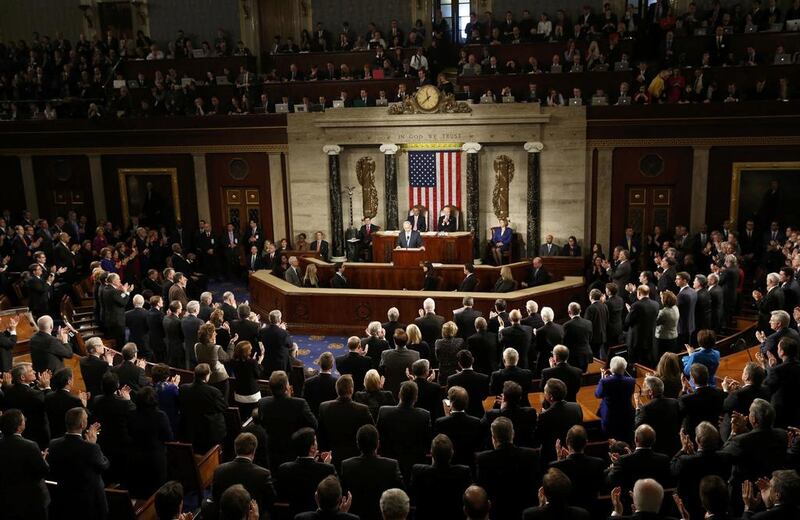New York // Israeli prime minister Benjamin Netanyahu warned against an emerging nuclear deal with Iran, telling a joint session of the US congress boycotted by many Democrats that it would “pave Iran’s path” to an atomic bomb.
“If the deal now being negotiated is accepted by Iran, that deal will not prevent Iran from developing nuclear weapons – it will all but guarantee that Iran will get those nuclear weapons – lots of them,” Mr Netanyahu said in a speech that critiqued the public details of a likely agreement and tried to offer alternative proposals.
The planning of the speech has riled Washington, with the White House and many Democrats denouncing the address – arranged behind the administration’s back by a Republican leader and Israel’s ambassador – as a political manoeuvre by Mr Netanyahu just ahead of a tough re-election bid, and that it was unseemly for a foreign leader to undermine sensitive US negotiations in the Capitol just as the talks entered their final stage.
Mr Obama and the Israeli leader have sought to play down the rift that has emerged, but it was clear that tensions continue to simmer. The White House announced on Tuesday morning that US president would hold a teleconference with European leaders during Mr Netanyahu’s congressional address.
Up to 59 of the 232 Democratic members of Congress boycotted the speech to protest against what they say is a Republican-engineered stunt to dent Mr Obama that has politicised US-Israel relations, normally a solidly bipartisan issue.
Reacting to the speech, Mr Obama said it offered no viable alternatives to the US approach.
He has argued that the deal being sought by the US would impose an invasive inspections regime on Iran’s nuclear programme, limit – but not eliminate – its uranium enrichment capabilities and stretch Iran’s “breakout” time to a bomb to at least a year, giving the international community time to respond.
The alternatives to such an agreement would do far less to prevent Iran from building a bomb, and could even accelerate its likelihood, administration officials say.
“Airstrikes would give Iran the justification to race ahead toward nuclear breakout, as well as providing it with the means to do so, because airstrikes would lead to, among other things, the almost total collapse of international sanctions,” the US national security adviser Susan Rice said on Monday. “And airstrikes cannot eradicate nuclear knowledge, and Iran possesses that in abundance.”
Legislators from both parties have said they would pass a tougher sanctions bill but would wait until the March 31 deadline for a framework deal to see what it entails. Mr Obama has said he would veto any new sanctions.
“I’m less concerned, frankly, with Prime Minister Netanyahu’s commentary than I am with Congress taking actions that might undermine the talks before they’re complete,” Mr Obama told Reuters on Monday.
The Democratic congressionl leader Nancy Pelosi described Mr Netanyahu’s speech as an “insult to the intelligence of the United States” and said she was “saddened by the condescension toward our knowledge of the threat posed by Iran”.
The US secretary of state John Kerry and his Iranian counterpart, Mohammad Jawad Zarif, met in Montreux, Switzerland, for a second day of talks on Tuesday in a final push to reach a deal. “We’re working away, productively,” Mr Kerry said during a break in the negotiations.
The broad contours of the deal have emerged in which Iran would have to restrict the number of its uranium enrichment centrifuges and open its nuclear programme to international inspectors for at least 10 years, in exchange for the gradual lifting of economic sanctions.
Mr Netanyahu opposed these terms point by point in his 39-minute address that was punctuated by 25 standing ovations from the Republican attendees and guests. He attempted to offer alternative terms.
“We can insist that restrictions on Iran’s nuclear programme will not be lifted as long as Iran continues its aggression in the region … [until it] stops supporting terrorism around the world … and stops threatening to annihilate my country”, he said.
Sanctions on “a very vulnerable regime” should not be lifted, he added, and implied that Iran should not be allowed any nuclear enrichment infrastructure until it acts “like a normal country”.
Mr Netanyahu essentially called for Iran’s acquiescence to demands that observers say are completely unrealistic, and would lead to a collapse of talks.
The Israeli PM also warned of the spectre of a nuclear arms race in the Middle East on the part of Iran’s Sunni Arab neighbours, some of whom have said they would seek the same terms as Iran for their own domestic enrichment programmes.
“A region where small skirmishes can trigger big wars would turn into a nuclear tinderbox,” Mr Netanyahu said.
After the talks in Switzerland, Mr Kerry is scheduled to meet Saudi King Salman in Riyadh to reassure him about the terms of a deal, before meeting foreign ministers from other Arab Gulf countries later in the week.
Gulf officials say that their primary concern is that a deal and lifting of sanctions would allow Iran to devote even more resources to pursuing a regional strategy that they say comes at their expense. Convincing these allies that a deal will not embolden Iran is crucial for the US, which relies on them in the fight against ISIL extremists.
tkhan@thenational.ae





